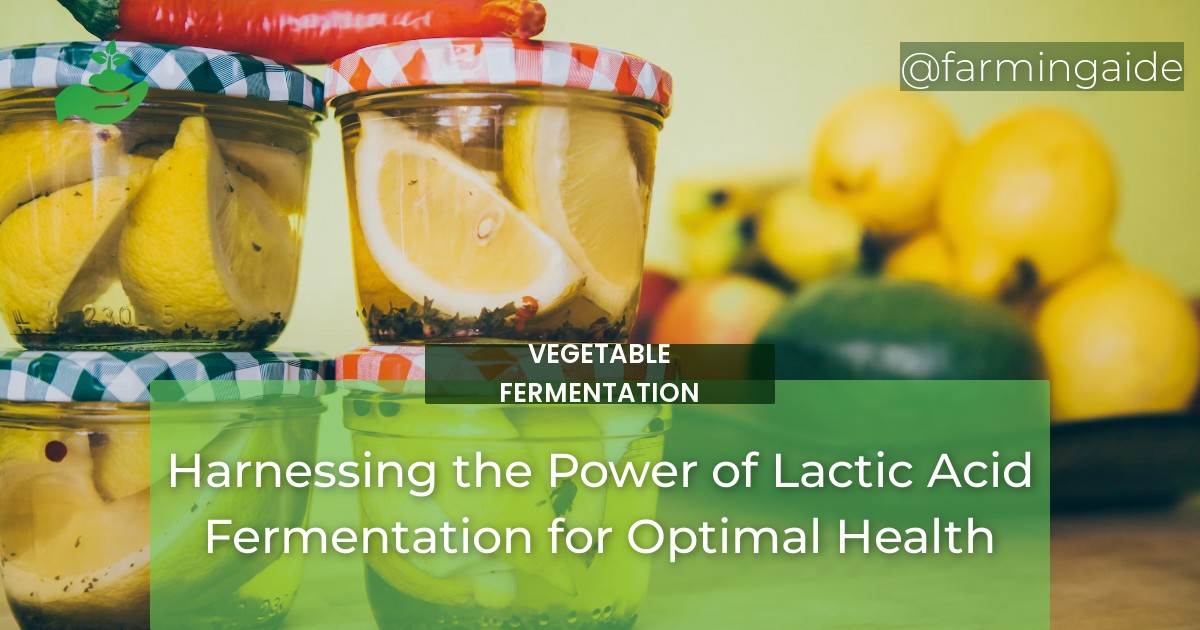Fermented foods have been a staple in traditional diets for centuries, and for good reason. These foods undergo a process known as lactic acid fermentation, which not only helps preserve them but also provides numerous health benefits. From improved gut health to enhanced nutrient absorption, lactic acid fermentation has been shown to have a positive impact on overall health and well-being. In this article, we will delve into the world of lactic acid fermentation and explore its role in food preservation, traditional culinary practices, and modern food production. We will also discuss the microbiology of fermentation, its nutritional benefits, and its potential for promoting gut health. So, let’s harness the power of lactic acid fermentation for optimal health.
Introduction to Lactic Acid Fermentation
Lactic acid fermentation is a natural process in which carbohydrates are converted into lactic acid by lactic acid bacteria. This process has been used for centuries to preserve foods and has played a significant role in traditional culinary practices around the world. Lactic acid fermentation is responsible for the tangy and sour taste in foods such as yogurt, sauerkraut, and kimchi. But beyond its role in food preservation, lactic acid fermentation also offers a host of health benefits that make it a valuable addition to any diet.Health Benefits of Lactic Acid Fermentation
– Improved Nutrient Absorption: Lactic acid fermentation breaks down the complex carbohydrates in foods, making them easier to digest and increasing the availability of nutrients for absorption. – Enhanced Gut Health and Digestion: The beneficial bacteria produced during lactic acid fermentation can help balance the gut microbiome and improve digestion. – Strengthened Immune System: The probiotics in fermented foods have been shown to enhance the immune system and protect against infections and diseases. – Reduced Risk of Chronic Diseases: Regular consumption of fermented foods has been linked to a lower risk of chronic diseases such as heart disease, diabetes, and certain types of cancer.How Lactic Acid Fermentation Works
During lactic acid fermentation, lactic acid bacteria convert sugars in foods into lactic acid, which lowers the pH level and creates an acidic environment. This process not only helps preserve the food but also produces beneficial compounds such as antioxidants and vitamins. The type of lactic acid bacteria present, as well as the pH level and temperature, can affect the fermentation process and the resulting flavor and texture of the food.Nutritional Benefits of Fermented Foods
– Increased Availability and Absorption of Nutrients: Fermentation breaks down the cell walls of foods, making nutrients more accessible and easier to absorb. – Higher Content of Beneficial Bacteria and Enzymes: Fermented foods are rich in probiotics and enzymes, which can improve gut health and aid in digestion. – Potential for Reducing Food Allergies and Sensitivities: The probiotics in fermented foods may help reduce inflammation and improve the body’s response to allergens.ALSO READ
Fermentation in Traditional Culinary Practices
Fermentation has been a crucial method of preserving foods for centuries, especially in cultures where refrigeration was not available. It is also deeply ingrained in traditional culinary practices, with fermented foods playing a significant role in various cuisines around the world. Traditional methods and techniques, such as using salt or starter cultures, are still used today to ferment foods like cheese, pickles, and sourdough bread.Microbiology of Fermentation: Role of Microorganisms
There are various types of microorganisms involved in lactic acid fermentation, including bacteria, yeasts, and molds. Lactic acid bacteria, such as Lactobacillus and Streptococcus, are the primary microorganisms responsible for producing lactic acid during fermentation. Different microorganisms can contribute to the fermentation process, resulting in different flavors and textures in the final product. Factors such as temperature, pH level, and the presence of oxygen can affect the growth and activity of these microorganisms.Food Safety Considerations in Fermentation
While lactic acid fermentation is generally considered safe, there are potential risks and hazards associated with the process. Contamination by harmful bacteria, improper sanitation and hygiene, and inadequate temperature control can lead to foodborne illnesses. It is essential to follow proper food safety guidelines and regulations to ensure the safety of fermented foods.Fermentation and Gut Health
The gut microbiome plays a crucial role in overall health and well-being, and fermented foods can have a significant impact on its composition. Regular consumption of fermented foods can help maintain a healthy balance of beneficial bacteria in the gut, which can improve digestion, boost the immune system, and potentially prevent and manage gastrointestinal disorders.Fermentation in Modern Food Production
With advancements in technology and equipment, fermentation has become an integral part of modern food production. It is used in various food processing techniques, such as brewing, baking, and pickling, to enhance the flavor, texture, and nutritional value of foods. Fermentation is also being explored as a way to improve the nutritional content of processed foods, making them more beneficial for overall health.Conclusion
Lactic acid fermentation is a natural and traditional method of preserving foods that offers numerous health benefits. From improved nutrient absorption to enhanced gut health, this process has a positive impact on overall health and well-being. By incorporating fermented foods into our diets, we can harness the power of lactic acid fermentation for optimal health. So, next time you reach for a jar of pickles or a cup of yogurt, remember the many unique benefits that lactic acid fermentation has to offer.RELATED ARTICLES:


